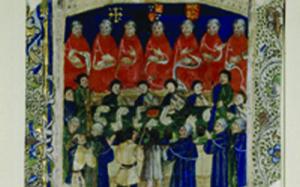Londoners and the law: pleadings in the court of common pleas, 1399-1509

The aim of the project was to analyse and make available online information from the 'plea rolls' of the court of common pleas - the largest surviving body of medieval English common law records. These are held in The National Archives (class CP40). Litigation in the middle ages - as today - was a popular, if sometimes controversial, method of achieving results, whether in trade, local society or domestic life. The surviving records show that, despite being satirised by writers of the period, the law was becoming ever more important as a tool for individuals and groups. The project examined cases involving Londoners, many of which arose from disputes with commercial and other contacts in the English counties, sheding light on the nature of the links between the city and the regions in the later middle ages. The project also sought to enlarge our knowledge of how individuals and groups (such as guilds) understood and used the law in relation to their business, family or property interests. Many cases revolved around such matters as unpaid debts, runaway apprentices and servants, or disputes over land. The project not only opens up a major source of information about medieval Londoners and their activities, but also deepens our understanding of how the law interacted with everyday life, whether it be in the areas of work, domestic and family life or urban regulation.
Data was collected and analysed from the 433 plea rolls which survive for the fifteenth century, a period which saw the court of common pleas become ever more popular amongst litigants. The results of the project will be made available through published articles, which will explore several key themes relating to cases involving Londoners.
The dataset from the project is now accessible via British History Online, the Institute of Historical Research's digital library of sources for British History. 'Court of common pleas: The National Archives CP40: 1399-1500' consists of summary translations of pleaded cases, involving London litigants or disputed events supposed to have taken place at London, heard before the Court of Common Pleas in the years 1399–1409, 1420–1429, 1445–1450, 1460–1468, 1480 and 1500 (all dates inclusive). In total it contains approximately 6,300 pleaded cases, involving over 30,000 individuals and 8,000 events.
Publications
Jonathan Mackman, '"Hidden gems" in the records of the common pleas: new evidence on the legacy of Lucy Visconti', in L. Clark (ed.), The fifteenth century VIII: rule, redemption and representation in late medieval England and France (Woodbridge, 2008), pp. 58-72; Matthew Stevens, 'Failed Arbitrations before the Court of Common Pleas: Cases Relating to London and Londoners, 1400–1468', Journal of Legal History, 31.1 (2010), pp. 21-44; M. Stevens, 'Londoners and the Court of Common Pleas in the Fifteenth century', in M. Davies & J.A. Galloway (eds.), London and Beyond: Essays in Honour of Derek Keene (London: Institute of Historical Research, University of London, 2012)
Reports
CMH Annual Reports 2005-6, 2006-7
Project details
Researchers: Jonathan Mackman, B.A., D.Phil. and Matthew Stevens, B.A., Ph.D.
Directors: Professor Matthew Davies, M.A., D.Phil. and Hannes Kleineke, M.A., Ph.D.
Funded by: Arts and Humanities Research Council (Award Ref. AR119247) (1 June 2006-30 November 2008)
Amount Awarded: £243,354
